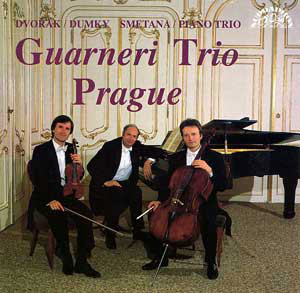|
|
Search MusicWeb Here |
|
 |
||
|
Founder:
Len Mullenger (1942-2025) Editor
in Chief:John Quinn
|
|
|
Search MusicWeb Here |
|
 |
||
|
Founder:
Len Mullenger (1942-2025) Editor
in Chief:John Quinn
|
 |
Antonín
DVOŘÁK (1841-1904) Piano Trio op 90 Dumky Bedrich SMETANA (1824-1884) Piano Trio op 15 Recorded Domovina Studio, September and November 1991 |
| CD available for post-free online mail-order or you may download individual tracks. For some labels you can download the entire CD with a single click and make HUGE savings. The price you see is the price you pay! The full booklet notes are available on-line. | |
|
NOTE • Click on the button and you can buy the disc or read the booklet details • You can also access each track which you may then sample or down load. • Further Information. |
|
|
Guarneri Trio Prague – Ivan Klansky, piano, Cenek Pavlik, violin, Marek Jerie, cello – have now recorded the Dumky twice for Supraphon. This is the earlier performance, dating from 1991 - the later is on 11 1463-2 131, volume 13 in Supraphon’s Chamber works series again recorded in the famous Domovina studios in November 1997 where it’s coupled with the op 65 Trio. Why record the Dumky again only six years later? Well the sound may have something to do with it. In 1991 it was rather glacial; not much bloom around the strings and a certain lack of projection as a result. In 1997 the Supraphon engineers gave the Trio a more balanced and sympathetic acoustic.
Klansky, Pavlik and Jerie were all born between 1947 and 1953 and in 1991 were in their early maturity as a trio. In the Dumky they are consistently quicker than their celebrated compatriots from the Suk Trio; in addition there are telling points of contrast between the Guarneri Trio in 1991 and 1997 and this is especially the case in their approach to slow movements. In 1991 Cenek Pavlik is highly expressive in the third movement Andante-Vivace non troppo with some succulent left hand intensifications. By 1997, at a very slightly quicker tempo (a tightening up structurally is a consistent feature of the differences as well) Pavlik is now much less obviously emotive. He has now rethought his approach to the movement almost entirely and by the time of the re-recording is more intimate, less theatrically expressive, more nuanced. The same is broadly true of the trio as a whole; external features are conveyed with rather more inward subtly. This brings with it a possible loss of obvious brio, but there are gains in thematic interrelatedness and in cohering a notoriously difficult structure.
The Smetana Trio was written as a response to the death of his four year old daughter in 1855. After an early performance before Liszt it was considerably reworked. The Guarneri is successful in this memorable, tempestuous work at scrupulously maintaining a proper balance between the visceral and the detached, without which the work tends to splinter. It is a collective achievement of some stature to integrate the potentially disparate elements and despite that cold acoustic the Trio generates considerable heat.
Jonathan Woolf
|
| ADDITIONAL INFORMATION •
You can sample only 30 seconds (or 15% if that is longer) of a given track. Select from the View tracks list. Each sample will normally start from the beginning but you can drag the slider to any position before pressing play. • PLEASE NOTE: If you are behind a firewall and the sound is prematurely terminated you may need to register Ludwig as a trusted source with your firewall software.
•You will need Quicktime to hear sound samples. Get a free Quicktime download here • If you cannot see the "Sample All Tracks" button you need to download Flash from here.
|
|
|
Return to Index |